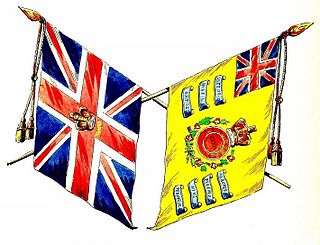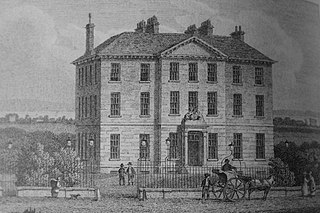Related Research Articles
William Dalrymple was a Scottish soldier and Member of Parliament (MP) in the British Parliament and Parliament of Ireland. He was the son of the Hon. George Dalrymple, brother of John Dalrymple, 5th Earl of Stair. Father of John Dalrymple, 7th Earl of Stair.
The 65th Regiment of Foot was an infantry regiment of the British Army, raised in 1756 as the 2nd Battalion, 12th Regiment of Foot. Under the Childers Reforms it amalgamated with the 84th Regiment of Foot to become the 1st Battalion, York and Lancaster Regiment in 1881.
The 35th Regiment of Foot was an infantry regiment of the British Army, raised in 1701. Under the Childers Reforms it amalgamated with the 107th Regiment of Foot to form the Royal Sussex Regiment in 1881.
Two regiments of the British Army have been numbered the 116th Regiment of Foot:

The 34th Regiment of Foot was an infantry regiment of the British Army, raised in 1702. Under the Childers Reforms it amalgamated with the 55th (Westmorland) Regiment of Foot to form the Border Regiment in 1881.
The 37th Regiment of Foot was a line infantry regiment of the British Army, raised in Ireland in February 1702. Under the Childers Reforms it amalgamated with the 67th Regiment of Foot to become the Hampshire Regiment in 1881.
Two regiments of the British Army have been numbered the 117th Regiment of Foot:
Three regiments of the British Army have been numbered the 118th Regiment of Foot:
Four regiments of the British Army have been numbered the 75th Regiment of Foot:
The 119th Regiment of Foot, also known as Fingall's Regiment, was an infantry regiment of the British Army, formed in October 1794 by Colonel Richard Wogan Talbot and disbanded in October 1795. It saw service as marines at the Battle of Groix in June 1795, losing a number of men. On disbandment, its soldiers were transferred to the 86th Foot.
The 74th Regiment of Foot (Invalids) was an infantry regiment of the British Army from 1762 to 1768.
The 73rd Regiment of Foot (Invalids) was an infantry regiment of the British Army from 1762 to 1768.
The 109th Regiment of Foot was an infantry regiment of the British Army from 1761 to 1763.
The 108th Regiment of Foot was an infantry regiment of the British Army from 1761 to 1763. It was raised in October 1761 from a cadre of the 31st Regiment of Foot, and was disbanded in 1763.
David Graeme was a British soldier, diplomat and courtier, responsible for carrying George III's proposal of marriage to Charlotte of Mecklenburg-Strelitz.

Major General John Scott of Balcomie and Scotstarvit (1725–1775) was a Scottish politician and senior British Army officer. He was nicknamed Pawky Scott. Pawky is Scots for sly, shrewd or one who tricks you.
Four regiments of the British Army have been numbered the 74th Regiment of Foot:
Henry Wallop was a British soldier and politician, the second son of John Wallop, Viscount Lymington.
James Gisborne was a British Army officer and Member of the Irish Parliament.
The 75th Regiment of Foot was an infantry regiment of the British Army from 1758 to 1763.
References
- ↑ "75th Regiment of Foot (Invalids)". regiments.org. Archived from the original on 16 October 2007.
- ↑ 75th (Invalids) Regiment of Foot, National Archives Catalogue index.
- ↑ 118th (Invalids) Regiment of Foot, National Archives Catalogue index.
| This article about a specific British military unit is a stub. You can help Wikipedia by expanding it. |